Moogfest this year was packed with talent. Trying to figure out what to see was like sifting for the most perfect diamond out of a bucket full of them. Every performance was a stand-out, but one of the best sets I saw was from duo
I Speak Machine, a pair that occupies a unique niche. Their set at Moogfest was a completely immersive audiovisual experience, with Tara Busch providing a live score to three short horror films directed by Maf Lewis.
On their own, the films would be effective and incredibly creepy, and the music would be compelling, evocative, and strange. Together, the expressive power inherent in each fuses to bear forth something new.
Sets from I Speak Machine are not so much shows as
events. As both an electronic/experimental music aficionado and a horror fan, I couldn't have been more thrilled by the performance. Sitting in the darkness of the Carolina Theatre, my eyes moved between the film and the musician in front of it, who stood amidst small towers of equipment and created some of the most hauntingly beautiful music I have ever heard. A fan beside me commented that something about Tara Busch reminds him of Tori Amos, and I can understand why: she has the same precise degree of control over her voice as well as a powerful capacity for expression in any register. She also possesses a quality of the ethereal that gives the performance an otherworldly edge.
The films--"Gagglebox," "The Silence," and "Zombies 1985," were innovative and truly scary. Of them, my favorite--and also the longest--was "The Silence," which follows a man as he moves through his life in a hellish haze of cacophonous sounds that range from screaming neighbors to the clicking pen of his coworker at their scientific lab. When he suddenly discovers the secret to
transporting matter, he whisks all of humanity except for himself into another dimension so he can enjoy a few days of blissful silence. Of course, things go badly. Tara's music added to the heightening sense of dread and finally the sheer terror the narrator feels when he realizes exactly what's happening.
While I Speak Machine is firmly grounded in their uniquely expressive performance style (they've been on tour with
Gary Numan and are heading into their own tour later this year), they're also expanding beyond this concept to investigate striking new ways of bringing the aural and the visual together. One of the products of this imagining is
STRATA, an interactive e-book/graphic novel about a far future world built with the efforts of I Speak Machine, comic book artist and illustrator
Tommy Lee Edwards, Google Labs'
Editions at Play,
Penguin/Random House, and
Lex Records. I had the opportunity to sit down with I Speak Machine afterwards and talk about everything they're up to (which is quite a lot). There was also a healthy amount of
geeking out about horror and science fiction.
Asheville Grit (AG): Let's talk about
STRATA. Tell me about the project a little.
Maf Lewis (ML): STRATA started out as a short film idea Tara and I had, but it was clear very quickly that it wasn’t going to be a short film, because it was a short film with a budget of $2 million.
Tara Busch (TB): It felt like it had quite a scope and grew quite quickly.
ML: And we knew Tommy Edwards—I’m sure you know him, he’s in North Carolina--
TB: In Hillsborough, very close. He’s amazing..
ML: He’s an amazing writer, director, and comic book illustrator, and he loved Tara’s music and Tara loved his artwork.
TB: It was
Brandon Generator, an interactive motion comic he did for Microsoft based in the UK with Edgar Wright and Julian Barratt from
The Mighty Boosh doing all the voices . . . and it just blew my mind. We were conceiving STRATA and we thought “maybe we’re onto something here.”
ML: So we chatted with him, he loved the idea and developed a core concept added to a whole world--
TB: This was
three or four years ago
ML: We talked to our label about it and they got really excited. So we thought, "Well look, let’s try and put a big project together and try to make a feature film or an animated series." And everyone was into it, so we’ve been working with on it for some time now. The audiobook [e-book] is the first installment of that which will grow. That's at
strata.world. And that’s really nothing to do with the story we came up with originally, that’s the world Tommy and I built around that.
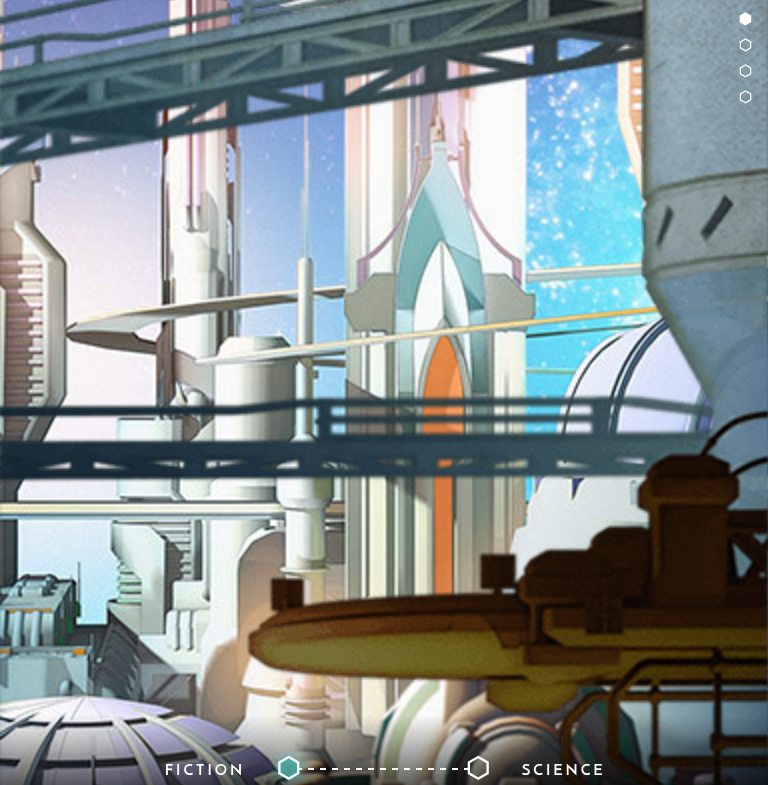 The world of STRATA
The world of STRATA
From the beginning, I've always been an enormous fan of really good SF, SF that really knows the science. And SF without the fiction is just science. As interesting as that is, I love it when homage is paid to the
original ideas and concepts. So when were creating the book we wanted to have two sides, one was the science side and one was the fiction side. I really enjoyed that concept, and Penguin/ Random House were into that, Tommy was into that, and they commissioned a bunch of science writers and a bunch of fiction writers, and Tara, Tommy and I came up with a series of subjects that we thought would be great, like Politics, Food, Law Enforcement...
We wanted to write
hardcore science essays about each concept, and then some SF as well. We’re going to continue building that out. The three of us have been working on the bigger project. Tommy in particular has been developing the world, the characters, and a bigger story, and this year we'll hopefully start working on either a series of half-hour episodes, maybe 6-8, or a feature. We’re open-minded about that, we’re just now raising funds for that.
I think the main author will be Tommy, building off our original concept enormously, and he’ll bring in other writers and work with them. The writers in terms of the series or the film will be very strictly directed by Tommy. But for
strata.world, the audiobook, we’re inviting a bunch of writers to come in and do their stuff, and that builds the world and the ideas around the world that we can take from.
AG: Are you guys fans of SF? What are some of your biggest influences, for
STRATA and for the rest of your work?
TB: I’m probably more of a fan of the music in SF films. I wouldn’t call myself a buff or an expert, because I’m kind of a newbie. I love horror and SF.
Logan’s Run really knocked me upside-down, and what especially stuck with me was the score by
Jerry Goldsmith, a beautiful mix of a massive orchestra and a huge modular synthesizer. So I think I’m more influenced and inspired by the music and the aesthetic of it.
Recently I’ve been really into just going into thrift stores and digging up old SF paperbacks, and that really inspires me musically a lot.
AM: And there’s a sense of
synesthesia, the visual elements coming together.
TB: Yeah, I would say that but just for the purpose of not claiming to be an expert with SF because people are so territorial with it. I get called out a lot and sometimes I have no idea what people are talking about [who are experts], but yeah, I love it, I’m inspired by it, it’s
beautiful, and then so much of it is new to me.
ML: I’m less of a SF novel reader than a film and television lover. My first SF love was the first
Star Trek series. Also
The Outer Limits and
The Twilight Zone.
TB: Rod Serling was my boyfriend.
ML: Even things like
Doctor Who. I like the simple easy concepts of things like
Star Trek and
Twilight Zone. With each episode you deal very quickly with something without getting too deep.
Twilight Zone was great because there was always that "be careful what you wish for" thing, which I really love. People always got their comeuppance when they were too greedy or too selfish.
TB: And actually even as far-fetched as it could be, it did really hit home with the so-called human condition. It felt very real watching these things, like the one with the ventriloquist dummy, or the one with the library, the guy that lost his glasses. You just get this feeling that it could happen to anybody. Cautionary tales.
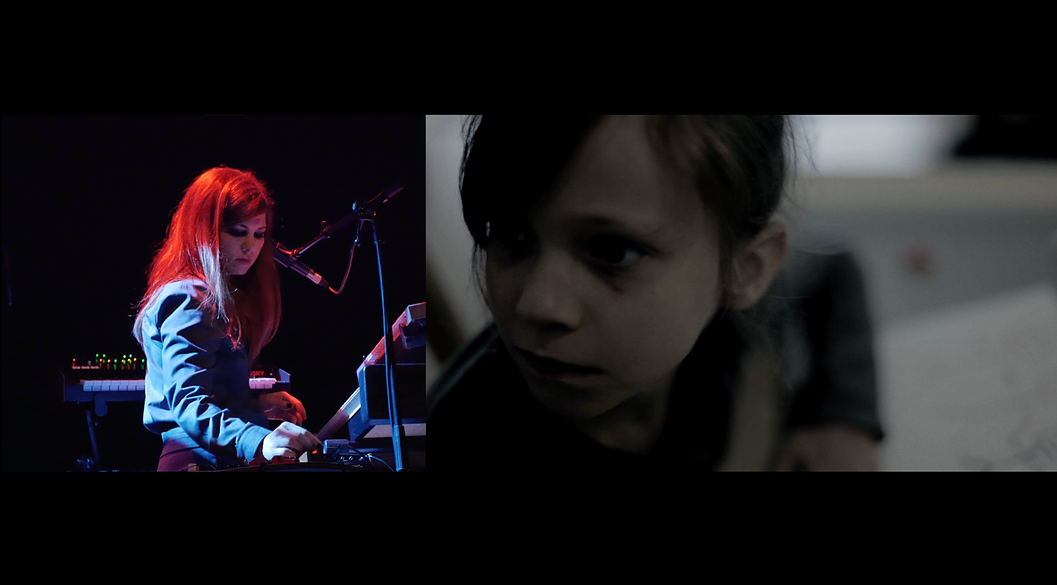 I Speak Machine's Tara Busch playing live score for "Gagglebox." Source: artists' website
AM:
I Speak Machine's Tara Busch playing live score for "Gagglebox." Source: artists' website
AM: Can you talk about the live scoring events? Does any part of the process come first?
TB: We try our best to work in tandem, simultaneously. All of the projects I Speak Machine has done so far have started with an idea and a synopsis, and as the story grows, the music grows. So I’ll take the synopsis and write a theme around that idea that feeds back into expanding the synopsis into a script or broader story. We try to go a switching of the dirver’s wheel.
When we were filming "The Silence," we came up with the concept of him being chased by something and we knew it had to have a
sound. After we had that idea, I went back and came up with a sound on the Moog. And when it finally came around to filming, we brought in an amp and had that sound going on the Moog [in the indoor scenes] so we could get the right atmosphere.
ML: So yeah, we try and write so that when the film is shown, the viewer's attention goes from the film to the performance. There are certain parts where you effectively
forget Tara’s there, and you’re watching a film and hearing a score. And then other times where you’re looking at Tara playing. There are specific parts of the movie where it’s a little slower and scenes are longer than they would be if you’re editing it and watching it on a screen in your home rather than at a live performance. Those are the moments where you want to give the music more time to have its fun.
TB: The films are made with a lot of space for the music, as opposed to a film that has loads of dialog without the music being a very key element. And that also comes down to us both being very big fans of films that stylistically have very prominent scores. I love
Suspiria, it’s a big influence. And Darren Aronofsky’s films--the way Clint Mansell’s music is so prominent in them, it’s literally like a character.
AG: Why do you create mostly horror and SF films? What is it about the horror genre that appeals to you so much?
TB: I love it. Ever since I can remember I’ve been drawn to unsettling, dark emotive stuff.
ML: Also who the fuck wants to do comedy scores?
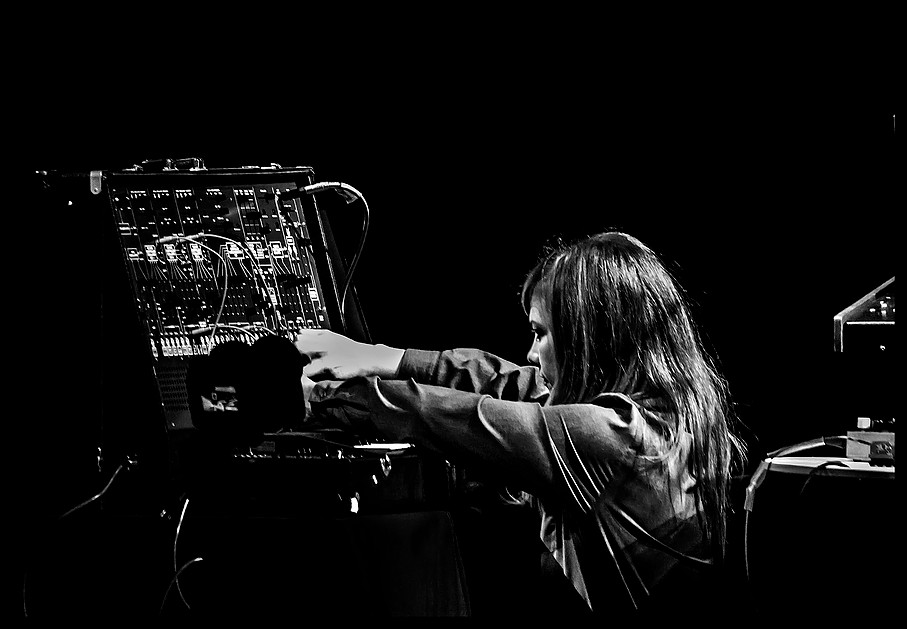 Souce: artists' website
ML:
Souce: artists' website
ML: Horror and SF are genres that lend themselves to beautiful scores. Think of all the
greatest scores of our time. They're dominated by horror, SF, thriller.
TB: Yeah, that component of something otherworldly we don’t understand lends itself to some interesting sounds, and that opens up the territory for sound design, writing, and music and makes you feel a lot more ambitious. It just feels a lot more
limitless creatively.
AG: I was thinking that there’s something about horror and sound going together that doesn't quite happen in any other genres.
ML: And to me, horror crosses SF and thriller. To me,
Jaws is horror, so is
Psycho. And
Rear Window.
AG: And
Alien.
TB: Yeah. And I think with horror music you really have the opportunity to make it your own. There’s a huge
resurgence of Goblin and John Carpenter and that kind of style, and that’s fantastic, but there are also some great chances to have a unique voice. Because I think within horror you can get a lot of same-iness, the [singsongy]"lalalala," the slowed-down music boxes, the same old stuff.
ML: It is quite difficult not to do that. It depends on a lot of things, but I have a lot of sympathy for people who create horror scores, because probably the directors or producers are the ones who want to create stuff like they’ve already seen, and they’ve got a job, so when someone goes into a child’s bedroom of course there’s gonna be a music box...
TB: Sometimes it’s irresistible.
ML: And we try to avoid that, but sometimes you want to use a trope, and you want to try and put your own thing into it.
TB: That said, "The Silence" was massively influenced by
Suspiria, it’s got
Suspiria all over it.
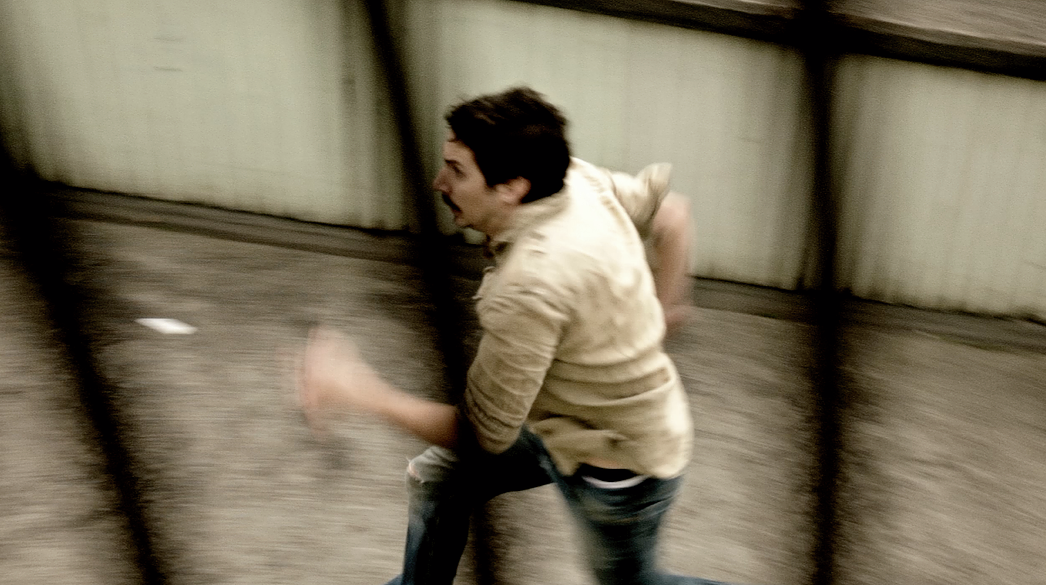 Shot from "The Silence," directed by Maf Lewis/I Speak Machine
ML:
Shot from "The Silence," directed by Maf Lewis/I Speak Machine
ML: In terms of doing everything in a completely original way, I mean, try and come up with an original horror idea and then go back and look at all the stuff that’s been made, all the TV series. Seriously the worst one ever is
Doctor Fucking Who, it’s like every idea I’ve come up with I’m looking at it, and thinking ahh this is really good blah blah blah--
TB: Or
The Simpsons...
ML: And then it’s like, every fucking idea has been done by
Doctor Who, or
Outer Limits, or
Twilight Zone. Usually by all 3. (laughs) Or
Star Trek’s done it. One of the five or six
Star Trek series has done it.
[Long geek-out period ensures in which we trade horror and SF recommendations]
AM: There's a screening of
It Follows on Sunday with
Disasterpeace.
ML: That is a wonderful movie. I love the score and I love everything about it.
TB: He apparently did that all with one piece of software. And then there's
The Witch! Talk about a creative and incredibly unique score, and the choral work!
ML: My favorite movies are those lower budget, generally independent, very small casts, SF or horror movies. One of my favorite movies of the last decade is
Moon, it just kills me, it’s one of the most beautiful.
And films like
It Follows,
Babadook.
To me, with those directors that have made those films, it seem like it’s just that really lucky moment where they have enough money where they do what they want to do but not too much money to spoil what they’re doing. Very few directors move on and do something really good after that, because once they jump up to an extra 0, it gets tough. Like Gareth Edwards with
Godzilla. He did one of the most beautiful SF movies I’ve ever seen,
Monsters. I thought that was fucking great, and then he went on to do
Godzilla.
It must be so tough for him to move from
Monsters to a big budget where you know full well he’s not really directing it, the producers are and borrowing his name. The same with Aronofsky when he did
Noah. You know the producers were fucking screaming every moment of it.
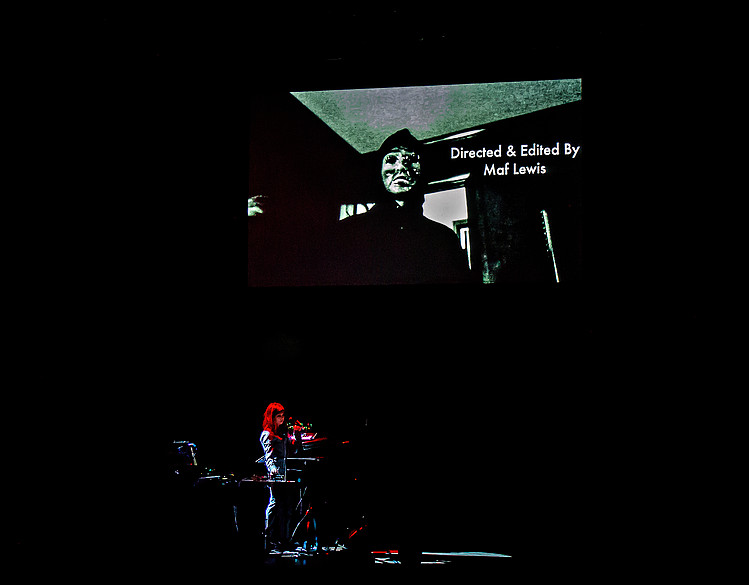 Source: artists' website
AG:
Source: artists' website
AG: So no big plans for you to do a Hollywood blockbuster film? (laughs)
ML: I would take the money!
But our next plan apart from
STRATA is a horror feature. We have some ideas for that, I’d love to do it under $500,000 where we'd raise that full amount in maybe one go and have complete
control. Once you get up into the $5 million mark then I think you have to do multiple strains of fundraising and you probably have less influence as a director and writer. I don’t want to do that yet. I want to do it the way we’ve done these shorter films, but it would be nice to have a budget to create the right.
TB: And have a big weird crazy choral thing.
ML: And the movie--I won’t go into any details—but literally it’s just a small movie in the sense it happens with two main characters, three or four supporting characters, two rooms and a staircase. We want to keep it like that so we can rent a house.
So our next ambitious thing is a low budget well funded movie that we have 100% control over. We'd cut two versions, a live and a non-live version.
TB: I had a lot of people ask at the show if we could release the films on
DVD. It would be interesting. It’s not really what we have in mind because it does affect the presentation, but then again if people want it...
ML: I wouldn’t want to present that to someone on a laptop to watch.
TB: But it would be interesting to see if it would make people want to come see it live, just like you would buying an album.
ML: When we do edit, we edit a live version. We film Tara playing in the movie, and we cut the movie in with
live footage of Tara, sometimes split screen, and then I can decide the moment when I think people should be looking at Tara.
AG: That’s so incredible, because I was totally doing that and was thinking about the fact you guys had thought about it.
ML: Good! That was me
controlling your mind.
AG: Mind control at Moogfest!
ML: And that’s the idea. When we first thought of it we thought, “How is this gonna work?” A lot of people have done scores to old black and white/silent movies, and I like that. We’ve done a little bit of that, but I just don’t think that’s for us. There are other people out there doing
great scores, but we didn’t want to do any more scores and we didn’t want to do visuals behind an act, there’s enough people doing that better than we could ever do.
So we wanted to have something truly original no one else had ever done or currently is really doing, but other people are looking at it, which is great. So conceptually the process is very important to us, not to the detriment of the final product, but when you get a point when you’re first planning, and you say at this moment someone's head should be looking at Tara, not at the screen, and 8 seconds later they should look back, and I’m watching the audience, and they’re doing that, it’s like “Yes!”
That’s success.
I Speak Machine will be at
NMASS Festival in Austin (June 22-26). They'll be touring with a group of British female artists in the fall, including Kite Base (Kendra Frost and Ayşe Hassan) and Hannah Peel. After that they'll hit the road with Gary Numan again for a European tour, followed by their own headlining tour later in the year.
STRATA is available for
the unbelievably low price of $3.26. It works and looks best on mobile devices.
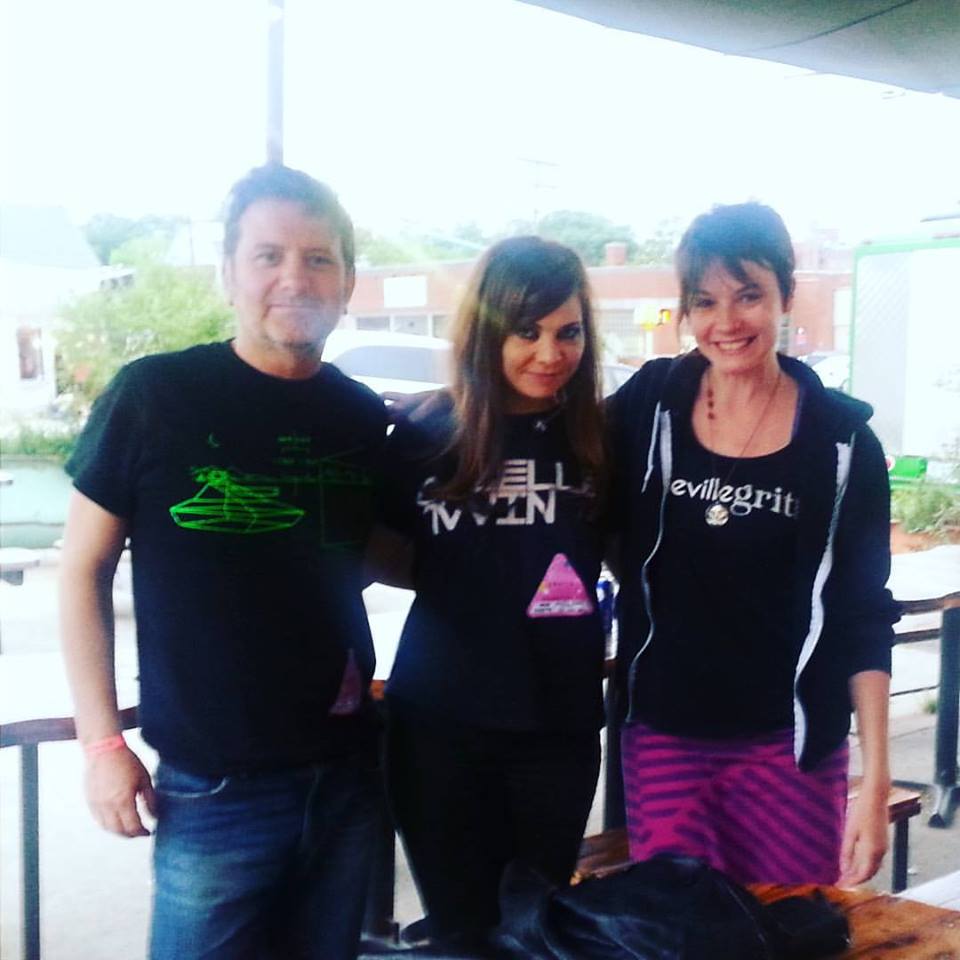 At Moogfest with I Speak Machine
At Moogfest with I Speak Machine